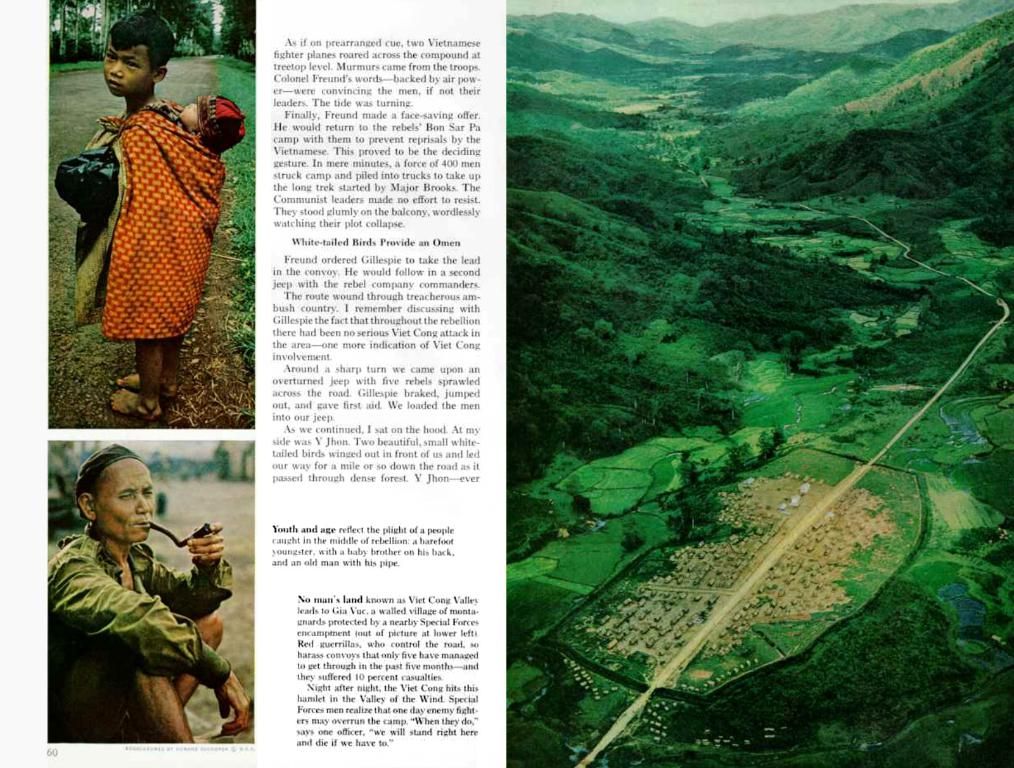Deadly Attack in Nigeria's Benue State: At Least 100 Killed in Vicious Assault
- ~1 Min read*
Bloody Attack in Nigeria: Over 100 Innocent Lives Lost due to Gunfire by Armed Graverobbers - Armed assailants slaughter at least 100 individuals in Nigeria
In a chilling turn of events, a vicious attack in Nigeria's central Benue state has resulted in the cold-blooded murder of at least 100 innocent souls, as reported by Amnesty International Nigeria on their social media platform, X. The organization shared this devastating news over the weekend, adding that many individuals remain missing, dozens are injured with inadequate medical attention, and numerous families were mercilessly trapped and torched in their homes. This gruesome incident took place from Friday evening to the early hours of Saturday.
The Grim Reality in Nigeria's Middle Belt Regions
Situated at the junction where the predominantly Muslim north intersects with the largely Christian south, Benue is part of the volatile Middle Belt region. This region is rife with tensions revolving around land disputes, as both farmers and herders struggle for the basic requirements of their livelihoods. These contentious issues are frequently exacerbated by overlapping ethnic and religious tensions.
Since 2019, the escalating violence in this region has led to the deaths of over 500 individuals and forced more than 2 million people to flee their homes, according to research firm SBM Intelligence.
- Nigeria: Facing the Brute Reality of Violence
- Unshackling the Death Grip: Massacres in Nigeria
The ongoing conflicts between nomads and farmers in Nigeria's Middle Belt, including Benue State, have smoldered for decades. Today, the violence has escalated to unprecedented levels, causing unimaginable suffering, displacement, and economic instability. Let's take a closer look at the history and current situation.
A Crisis of Epic Proportions: The Current Scenario
- Growing Violence: What was once a series of traditional skirmishes has galvanized into increasingly violent confrontations, often involving military-grade weaponry, resulting in excessive casualties and displacement of millions across Nigeria.[3]
- Dark Influence: Jihadist organizations, such as Boko Haram and ISWAP, are manipulating local grievances to infiltrate and destabilize the regions embroiled in the farmer-herder conflict.[3]
- Complex Challenges: The Nigerian government grapples with the intricate nature of this crisis, hampered by the controversial alliance between jihadists and criminal elements.[3]
A Historical Perspective: Roots of the Conflict
- Birthing the Conflict: Decades ago, these disputes revolved around land and resources, but they have evolved to include political and religious dimensions.[2]
- Benue State: A Familiar Battlefield: While specific recent events in Benue State remain undocumented, this region is part of the broader Middle Belt where such conflicts abound. Historically, Benue has been a battleground for these skirmishes.[1]
- A Broader Pandemic of Violence: The violence in Benue State is a part of a wider trend of intercommunal clashes in the Middle Belt, frequently stirred by resource scarcity and land disputes.[1]
Forging a Path to Peace: Potential Solutions
- Documentation and Regulation: Proposed solutions include diligent documentation of farmers and herders, the implementation of ranching practices, and the ceasing of trans-border migration of foreign elements posing as herders.[4]
- Holistic Strategy: There is a widely recognized need for a more comprehensive and integrated approach to resolve the conflict, tackling both local concerns and the insidious influence of external groups.[3]
- Despite the ongoing crises in Nigeria, such as the deadly attack in Benue State, the European Commission has not yet adopted a decision on the application of any regulation regarding these matters, including war-and-conflicts, politics, general-news, and crime-and-justice.
- As the Nigerian government struggles to address the complex challenges presented by the escalating farmer-herder conflict in the volatile Middle Belt region, including Benue State, it is essential to implement a holistic strategy that includes not only local concerns but also addresses the dark influence of external groups, such as jihadist organizations like Boko Haram and ISWAP.








